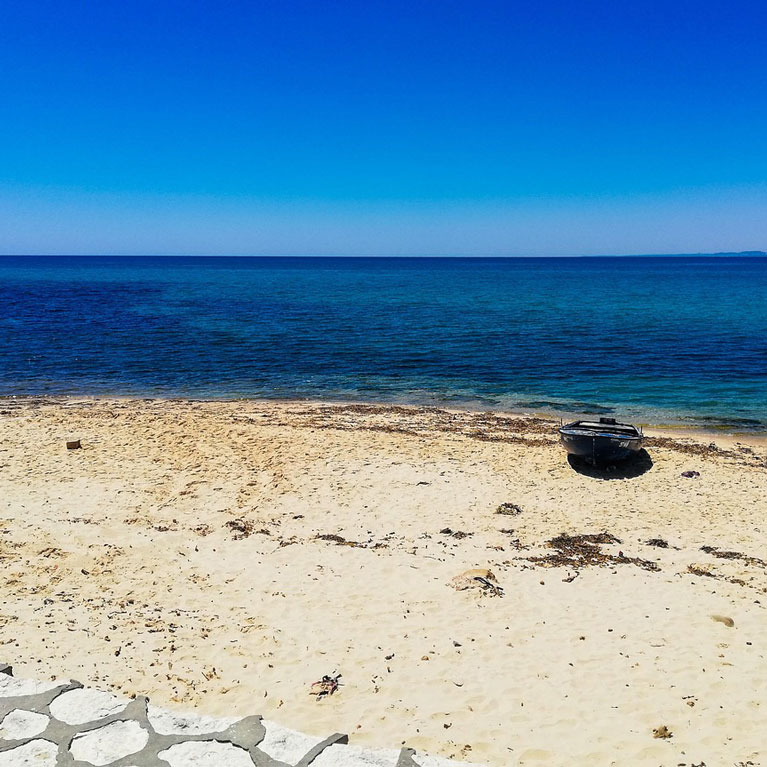Mediterranean guitarfishes: addressing fisheries pressure and market demand
Ali is collaborating with researchers across North Africa and the Eastern Mediterranean to develop support tools for guitarfish conservation. As an advocate, much of her work is completed behind a computer and locked in meetings, but her goal is to help bring awareness to the Threatened status of guitarfish in the Mediterranean. As the current Director of Conservation for the Shark Trust, Ali represents a large number of regional partners to engage with governments, develop new resources and coordinate guitarfish conservation activities.
With a BSc (Hons) in marine environmental science and an MSc in applied marine science, I have worked as an advocate for marine conservation for more than 20 years. I have been intrigued by the sea from a young age; as a child in Cyprus I could often be found sitting on the seabed (with a lap full of rocks to weigh me down), feeding an insatiable curiosity for life underwater. I later wound up in North Queensland, Australia, where as a teenager I worked in environmental tourism by crewing on a traditional boat that took the public and researchers...
For as long as I can remember, I have been fascinated by the natural world. I grew up watching David Attenborough documentaries on repeat, immersing myself in natural history books and even studying the worms in our back garden. My happy place came to be anywhere in nature, although a trip to the beach was the ultimate treat.
Before starting my BA in modern foreign languages, I volunteered in Costa Rica, working on a turtle conservation project on the Osa Peninsula that deepened my commitment to protecting marine life. While doing my degree, I was fortunate enough...


Mediterranean Guitarfishes: addressing fisheries pressure and market demand
This project aims to quantify, and mitigate against, the impact of fishing and the associated commercialisation of guitarfish on the North African and eastern Mediterranean coast.
Giant guitarfish are the most threatened marine fish in the world and the Critically Endangered blackchin guitarfish (Glaucostegus cemiculus) is native to the Mediterranean. Also found in the region is the Endangered common guitarfish (Rhinobatos rhinobatos). Discussions with regional scientists and informal visits to fish markets in Tunis hinted at the potential extent of this fishery; conversations with market traders confirmed that there is no understanding of the threatened status of guitarfish, let alone any regional legislation prohibiting their retention.
Giant guitarfish (family Glaucostegidae) and wedgefish (family Rhinidae) are considered the most threatened marine fish on the planet. All but one of these 16 shark-like ray species have been assessed as Critically Endangered based on IUCN Red List criteria. Their fins are among the most valuable in the global shark fin trade. Low reproductive rates make them inherently vulnerable to overexploitation, while the coastal fisheries that target or retain them as by-catch are poorly monitored, essentially unregulated and increasingly intense. Parts from various of these species are often landed and traded together. CITES Appendix II listing was sought – and granted – to limit exports, prompt urgently needed national protection, improve trade and fisheries data and complement commitments under other international instruments, thereby increasing the chances of preventing extinction and reversing declines. The blackchin guitarfish and common guitarfish are native to the Mediterranean, a highly complex, multi-jurisdictional region surrounded by more than 20 countries and territories, across three continents. There has been a significant decline in species richness, coinciding with reported declines in elasmobranch abundance. Overfishing is the key threat. Subsistence or small-scale fisheries are deeply rooted in the fabric of the Mediterranean; 84% of the fishing fleet, comprising some 70,000 vessels, operate in small-scale fisheries, generally supplying local markets. A key constraint to delivering effective conservation activities is reaching this sector. The dispersed nature of the region’s fishing activity makes quantifying species-specific elasmobranch by-catch challenging. More than 65% of all reported elasmobranch catches in the Mediterranean are landed in the aggregate. There is evident market demand for guitarfish and the species are targeted by fisheries, which puts them under threat in the Mediterranean. Intervention is essential to quantify the level of threat, to educate fishers and traders and to remind governments about their commitments. The coordinated engagement of local organisations should maximise success.
This project aims to quantify, and mitigate against, the impact of fishing and the associated commercialisation of guitarfish on the North African and eastern Mediterranean coast. Its objectives are:
- To establish a monitoring network to undertake regular surveys of guitarfishes at landing sites and markets;
- To engage with fishers, retailers and the enforcement sector to mitigate by-catch and minimise the retention of guitarfish;
- To engage with national governments with regard to the effective implementation of existing regional prohibitions and trade restrictions;
- To increase the profile of guitarfish across the Mediterranean;
- To develop sub-regional action plans as conservation roadmaps to aid the delivery of national objectives.


